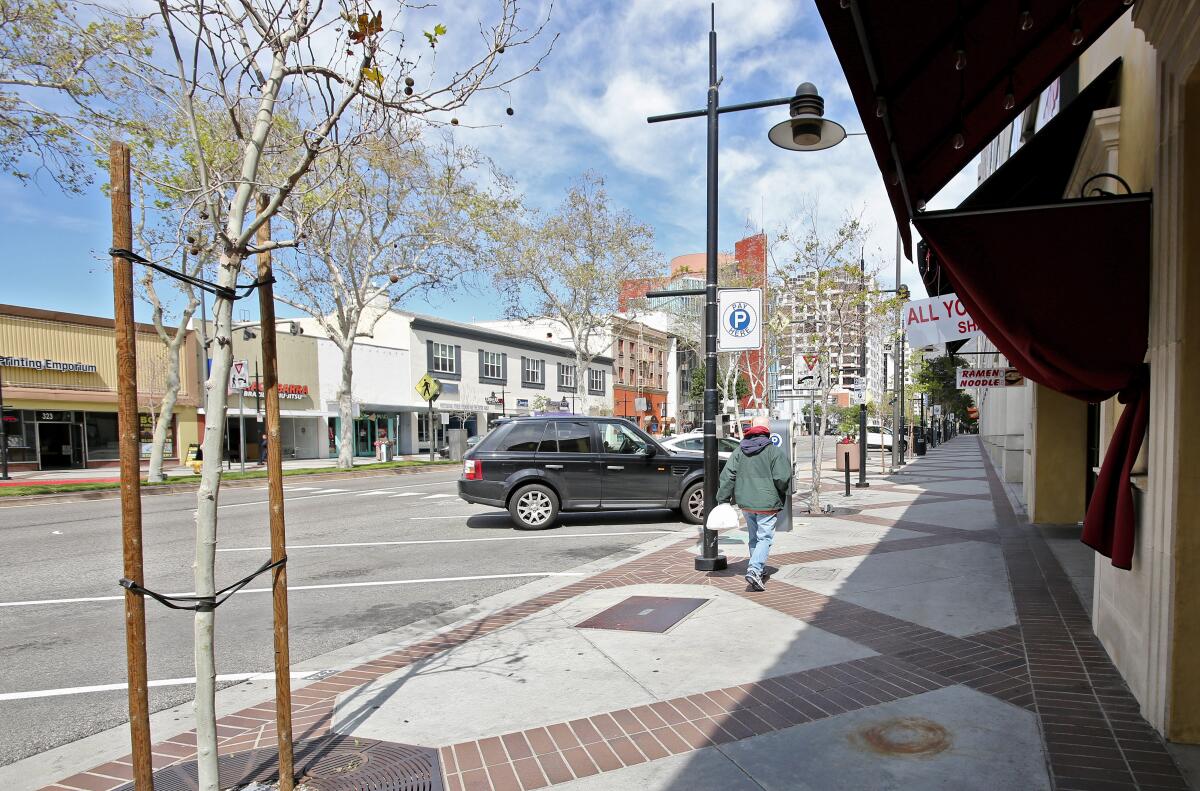The Whiteboard Jungle: What kind of a world are we living in?

- Share via
Incredible how our lives teeming with jobs, errands and recreation can be instantaneously wiped clean, filtered down to only one concern: “Do we have enough toilet paper to get us through the week?”
Going to work and school, eating out, attending movies and concerts, celebrating birthdays and anniversaries, observing religious traditions — all halted. Freeze frame life as we know it.
And the places that remain open such as grocery stores are scenes from a bad end-of-the-world Netflix show.
My son and I have traveled to market to market to cobble together meat, eggs, and peanut butter, standing in lines, standing apart. We drove by two gun stores in Burbank, each with a line of people outside. Just what kind of world are we living in?
One where terms like “coronavirus,” “COVID-19” and “social distancing” have been added to our existence.
It is dizzying to think how much has transpired in the past week. Gov. Newsom said on Tuesday that schools are unlikely to reopen this academic year.
Funny how the last school day was Friday the 13th. At that time, it was clear that schools would not resume soon after spring break. As my students left, I joked to them “Happy Fourth of July!” not knowing how prescient that was.
State testing has been canceled, the College Board plans on administering Advanced Placement tests online, and graduation ceremonies — well, who knows?
Never before will so many people have to rely on technology to keep them connected to their work and their loved ones.
Glendale Unified teachers scheduled to return to work on March 23 most likely will remain at home, watching webinars on how to design online lessons to salvage the remaining weeks of the spring semester.
A life without doing whatever we want is unchartered territory for all but those old enough to have lived through World War II and the Great Depression. They remember rationing of tires and sugar, meatless meals and gasless days. It was not uncommon to ask Americans to sacrifice for the greater good.
The closest most people alive today can relate to any kind of sacrifice would have been the rationing of gas during the oil crisis of 1973 when drivers were only allowed to buy gas based on the odd/even last number on their license plate.
So the idea of giving something up even temporarily is a habit alien to most. That partially explains why some people, mainly young ones, are not heeding the advice of government officials to stay home unless absolutely necessary.
While we want to believe that during a crisis people’s better parts rise to the occasion, toilet paper hoarding proves otherwise. How many 24-packs of toilet paper do people need? Thinking of other people is an ancient practice it seems.
There is a scene from “It’s a Wonderful Life” when the stock market crashes and people run into the Bailey Building and Loan to take their money out. George pleads with his customers not to drain the limited bank’s money supply, but to only ask for small amounts to get them by in the short term. While some take all of their money, others think about George and other customers by limiting their withdrawals.
That’s the kind of neighborly attitude we need right now.
If we are to get through what possibly may be the worst pandemic since 1918 when over 675,000 Americans died out of 103 million, we all have to sacrifice for the greater good.
As I tell my students, the one comforting aspect when studying disasters in history is that we know when they ended. Yes, the Civil War was horrible, but it was only four years long. But those alive in the 1860s had no idea how long that tragedy would last.
Not knowing how long the current health crisis will last creates anxiety in us. We don’t know what the coming months will bring.
The one constant that has helped my family cope with this health crisis has been our dog Noble. He doesn’t care about COVID-19, only that his bowl has food, he has a walk, goes for a car ride, and plays with rope toys. How delightful to be blissfully ignorant of the dramatic changes we are all enduring.
